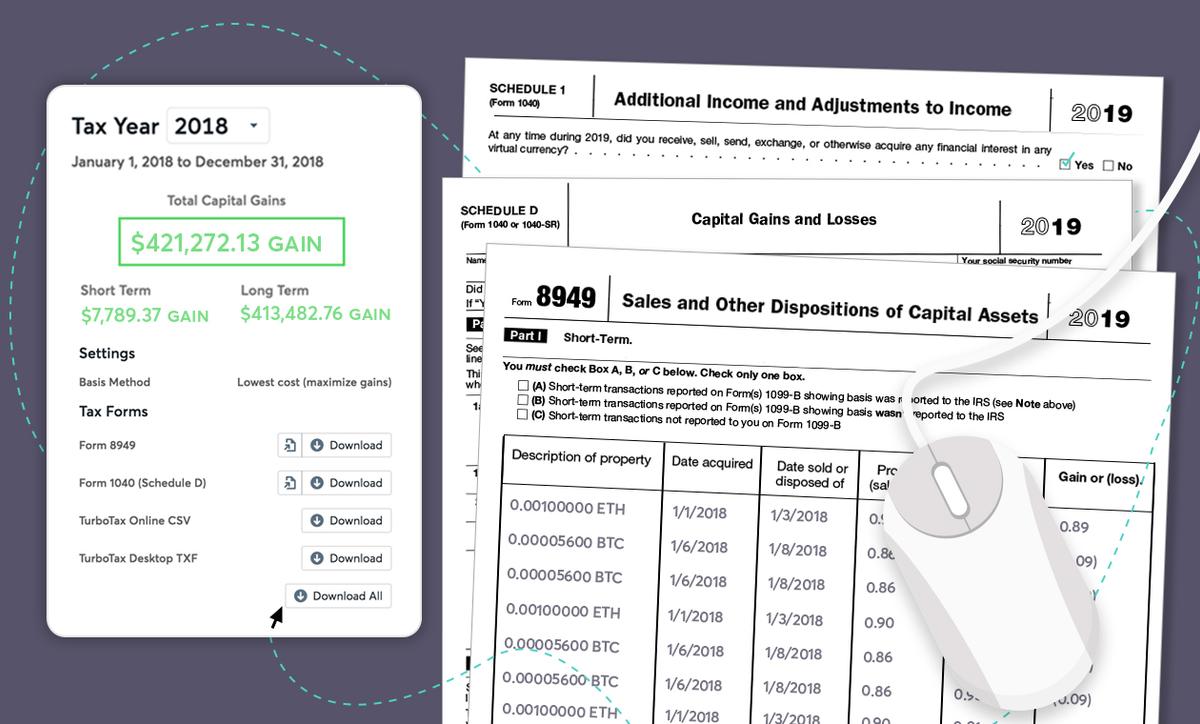
Cryptocurrency transactions are taxable in the United States, and failure to report to the IRS could result in significant consequences. Despite the pseudonymous nature of crypto transactions, increased regulatory scrutiny and Know Your Customer (KYC) requirements make transactions traceable and potentially linkable to individuals. We know that the IRS has actively sought information from US crypto exchanges, and as regulations evolve, more exchanges are expected to share data with tax authorities, leading to greater transparency.
Understanding tax compliance is essential for US investors, as reporting taxable transactions is mandatory regardless of whether the IRS is aware of your crypto activity. If you find yourself owing taxes on your crypto gains, evading payment is not a viable option. However, there are some legal strategies to either minimize tax paid on your crypto which we explore in this article.
Disclaimer
This guide is intended as a generic informative piece. This is not accounting or tax advice that can be relied upon for any UK individual’s specific circumstances. Please speak to a qualified tax advisor about your specific circumstances before acting upon any of the information in this article.
How is crypto taxed in the US?
In the United States, crypto is subject to capital gains tax and income tax. Capital gains tax applies when you sell, exchange, gift, or spend crypto, while certain returns from crypto activities, like mining or staking, are treated as income and taxed accordingly.
For a more detailed understanding of crypto taxation in the US, consult our comprehensive US cryptocurrency tax guide or try our crypto tax calculator to calculate your tax liability accurately.
Tax evasion vs. tax avoidance
It's important to note the difference between tax evasion and tax avoidance:
Tax evasion
Tax evasion involves intentionally evading tax payments through illegal methods, such as providing false information or withholding information from tax authorities. It is a criminal offence in the US, leading to potential fines, penalties, and imprisonment upon conviction.
Tax avoidance
Tax avoidance is the legal practice of minimizing tax liability within the boundaries of the law. It involves structuring financial affairs to reduce tax obligations while remaining compliant with specific provisions, exemptions, deductions, or incentives.
Legal strategies to minimize crypto taxes in the US
While tax evasion is illegal, there are legal ways for US investors to strategically navigate crypto taxes to reduce their tax bills:
- HODL for long-term capital gains: holding onto your cryptocurrency for over a year before selling can qualify you for lower long-term capital gains tax rates.
- Strategize activity in lower income years: consider adjusting your crypto activities to coincide with years of lower income to reduce your tax liability.
- Offset gains with losses: utilize losses from other investments or crypto assets to offset gains and reduce your overall tax burden.
- Tax loss harvesting: strategically sell underperforming assets to realize losses, which can be used to offset capital gains taxes.
- Gift crypto: a tax-efficient way to transfer assets and potentially avoid capital gains taxes.
- Donate to charity: donating cryptocurrency to eligible charities can result in tax deductions while also supporting a cause you’re passionate about.
- Retirement account: investing in crypto through a retirement account, such as a Self-Directed or Crypto IRA, may help you to defer taxes or potentially avoid them altogether.
- Select optimal cost basis method: choosing the most advantageous cost basis method when calculating capital gains and losses can help reduce your tax bill.
- Utilize deductions: take advantage of deductible expenses related to your crypto activities, such as trading fees or expenses incurred for mining or staking.
- Relocate: research countries with favorable crypto taxation policies and consider relocating to reduce tax liabilities.
- Use crypto tax software: accurately calculate taxes, track your portfolio, and identify opportunities for tax reduction.
Remember, while tax optimization is legal and can significantly reduce your tax burden, compliance with US tax laws is paramount. Below we go into more detail on different tax saving strategies but personal circumstances differ so you should seek guidance from a qualified tax professional to ensure adherence to local tax regulations and maximize available benefits.
HODL your cryptocurrency for long term gains
Long term capital gains are typically taxed at a lower rate than short-term, so holding on to your cryptocurrency for more than a year before disposing of it, often means tax savings.
- Long-term gains apply when crypto assets are held over a year. You’ll pay between 0% to 20% tax.
- Short-term gains apply when you’ve held your crypto for less than a year and are taxed at your regular income tax rate, which can be high for those in higher income brackets.
Strategize activity for years with lower taxable income
It’s useful to be aware of different tax rates, as your crypto is taxed at different rates based on your total taxable income. As your income increases, so does your tax rate, therefore if you can time your crypto disposals for years when you’re taxed at a lower rate you can make big tax savings.
Relocating to crypto friendly states or countries
US citizens are subject to federal taxes regardless of their global residence; however, some states offer more favorable tax environments. States such as Arizona, Florida, Texas, and Wyoming, have emerged as attractive destinations for crypto enthusiasts. Conversely, some US states, New York, for instance, impose hefty personal income and capital gains taxes, along with stringent regulations on the crypto industry making it less favorable for crypto investors and miners seeking to minimize their tax liabilities.
For international taxpayers, countries like Germany, Hong Kong, Singapore, and Dubai offer favorable tax laws for crypto transactions and are hot destinations. Although relocating is becoming a worthwhile option for crypto investors with flexibility to look into, it's not suitable for everyone and it's also important to consider that regulations can change.
Offset gains with losses
Losses suck, but do come with a silver lining - if you have realized losses, even outside of cryptocurrency, you can use these to offset capital gains during the same tax year. If your losses are higher than your gains then they can also be rolled forwards to future tax years to help lower your tax liability further.
Tax loss harvesting
None of us enjoy losing money, but, if you are holding any crypto assets at a loss in your portfolio then you could consider selling them. If you have any assets worth less than their initial value when you first purchased or received them, then disposing of the asset will realize a loss that can be used to offset your gains and reduce your tax liability.
For example if you sold some Bitcoin and made a $5k gain, but you are also holding Ethereum that you bought at $20k but that’s now only worth $15k you could sell the ETH (in the same tax year) to realize a $5k loss to balance out your gain.
You might have heard of the wash sale rule for stocks and shares; this rule currently doesn’t apply to crypto, so if you don’t fancy bidding farewell to your crypto forever, you can swiftly repurchase the same asset, crystallizing the loss. This is a legal loophole that the IRS has their eye on, so be aware that change is likely on the horizon!
Gifting crypto
Gifting cryptocurrency can be a great way to share your wealth while also enjoying tax benefits in the US. Under current regulations, individuals can gift up to $17,000 per recipient in the 2023 tax year ($18,000 in 2024) without triggering any gift tax liability. By transferring crypto assets to family members or friends, gifting crypto allows you to potentially avoid capital gains taxes that would have been incurred if you sold the assets instead.
Donate crypto to charity
Donating cryptocurrency to charities is another fantastic way to give back while also getting some tax perks. When you donate crypto, you can get a tax deduction based on the current value of the assets. This means you could lower your taxable income and potentially pay less in taxes overall. Plus, when you donate directly to charities, you skip the capital gains taxes you'd have to pay if you sold the assets first. It's a simple and effective way to support causes close to your heart while also taking advantage of tax benefits.
Investing in crypto through a retirement account (crypto IRA)
Investing in cryptocurrency through a retirement account can be a savvy tax strategy, providing both investment potential and tax advantages. By utilizing retirement vehicles like Individual Retirement Accounts (IRAs), you can optimize your tax position while building your crypto portfolios for the future. There are two types of IRAs, a Traditional IRA and a Roth IRA. With a Traditional IRA, your contributions are tax-deductible, allowing you to lower your current tax bill and you won't pay taxes on your investment gains until you withdraw the funds during retirement. On the other hand, contributions to a Roth IRA aren't tax deductible, but you'll enjoy tax-free withdrawals in retirement, so your investment gains grow tax free. We highlight the benefits in the bullets below:
Traditional IRA:
- Contributions are tax-deductible (up to a limit), reducing your current tax bill.
- Investment gains are tax-deferred until you withdraw the funds during retirement.
- Ideal for individuals seeking immediate tax benefits and expecting to be in a lower tax bracket during retirement.
Roth IRA:
- Contributions are not tax-deductible.
- Investment gains grow tax-free, providing potential long-term tax advantages.
- Suitable for individuals looking to maximize tax-free growth potential in retirement.
Select the most optimal cost basis method
The cost basis method, which is essential for figuring out how much an asset originally cost for tax purposes, helps determine capital gains or losses when you sell it. There are multiple cost basis methods to choose from,
- Specific Identification (SpecID) - If you can specifically identify the unit or units involved in the trade, then you can select which units are deemed to be sold.
- First-in, first-out (FIFO): units are sold or disposed of in a chronological order beginning with the earlier or first unit acquired
- Last-in, first-out (LIFO): the last assets you bought are the first assets you sold or exchanged.
- Highest-in, first-out (HIFO): assumes the most expensive asset you bought is the first asset you sold or exchanged
- Lowest-in, first-out (LOFO): assumes the least expensive asset you bought is the first asset you sold or exchanged
Choosing the optimal method can lead to significant tax savings, but it’s also wise to seek advice from a tax professional before committing to a cost base method to ensure your choice doesn’t raise eyebrows. The IRS prefers simplicity and consistency, so we recommend Specific Identification and FIFO (First In, First Out).
Utilize deductions and tax thresholds
US taxpayers can optimize their tax situation by understanding applicable tax thresholds and identifying eligible deductions. Subtracting certain expenses from your taxable income can reduce your overall tax liability when filing your tax return. With multiple tax deductions to be aware of that vary depending on filing circumstances, make sure you check what you're eligible for. Below we explore some of the most common deductibles crypto investors use to lower their tax bill.
Incidental costs of purchase and disposal
There is not much IRS guidance on what is acceptable, so the best practice is to assume that if the cost relates to the acquisition and disposal of cryptocurrencies, then it is allowable. Therefore, while cryptocurrency trading fees are likely deductible, transfer fees do not follow this same rule.
Mining expenses
If you are a mining business you can claim deductions relating to mining operations including:
- Equipment and repair expenses
- Office/ rented space
- Electricity
- Any losses
It’s crucial to maintain accurate records of all expenses in case of an IRS audit. Consulting with a tax professional familiar with cryptocurrency taxation can also ensure compliance with tax laws and maximize available deductions.
Consult a Tax Professional
Working with a CPA or tax attorney can help you develop a tailored tax strategy. While hiring a professional may incur expenses, the potential tax savings often justify the investment. Tax professionals can ensure compliance, maximize deductions, and provide long-term savings.
Use Crypto Tax Software
Cryptocurrency tax software helps you accurately calculate your crypto taxes and simplifies the process of filing your tax return. It also enables you to keep track of your whole crypto portfolio throughout the tax year, highlighting your unrealized gains and losses and identifying opportunities for minimizing your tax bill, all whilst staying compliant with IRS regulations.
Staying informed and compliant is key. Employing strategies like long-term holding and tax loss harvesting can help minimize your tax liabilities legally. Consulting with tax professionals and using crypto tax software can provide invaluable assistance in optimizing your tax position and ensuring accurate reporting.



